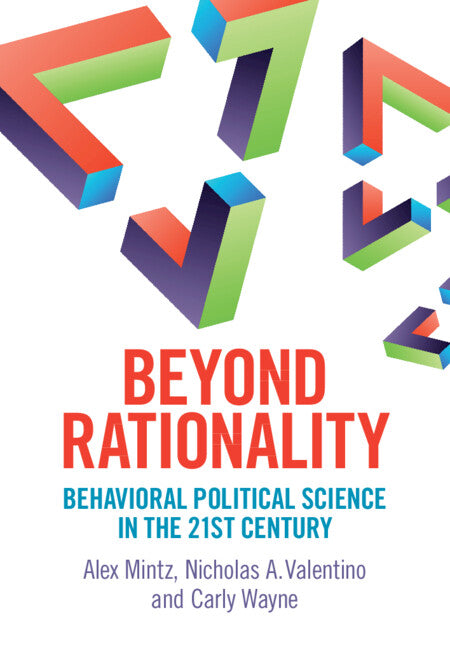Freshly Printed - allow 4 days lead
Couldn't load pickup availability
Beyond Rationality
Behavioral Political Science in the 21st Century
The first textbook to present a framework of the Behavioral Political Science paradigm for understanding political decision-making.
Alex Mintz (Author), Nicholas A. Valentino (Author), Carly Wayne (Author)
9781316516355, Cambridge University Press
Hardback, published 2 December 2021
294 pages
25.9 x 18.1 x 2.2 cm, 0.72 kg
'Mintz, Valentino, and Wayne masterfully explicate the frontier of the science of political behavior, demonstrating how insights from psychology, economics, communication studies, and political science weld into a formidable set of theories essential to understanding how politics works – in general, across domains, and with particular applications to a range of contemporary issues. As experts whose own work has defined this frontier, the authors provide a singularly comprehensive and coherent explanation of how factors such as limited information, cognitive biases, identity, and emotions shape the beliefs and decisions of political actors, including voters, candidates, terrorists, and foreign policy makers. Any reader seeking to make sense of our dizzying political world will be engaged and enlightened.' Elizabeth J. Zechmeister, Cornelius Vanderbilt Professor of Political Science, Vanderbilt University
How and why do people make political decisions? This book is the first to present a unified framework of the Behavioral Political Science paradigm. – BPS presents a range of psychological approaches to understanding political decision-making. The integration of these approaches with Rational Choice Theory provides students with a comprehensible paradigm for understanding current political events around the world. Presented in nontechnical language and enlivened with a wealth of real-world examples, this is an ideal core text for a one-semester courses in political science, American government, political psychology, or political behavior. It can also supplement a course in international relations or public policy.
1. Living in interesting times: How can behavioral political science help us understand the current political moment?
2. The rational actor model of political decision making
3. The limits of human processing: Bounded rationality, heuristics and biases
4. What you say may matter less than how you say it: The role of framing in political communication effects
5. The limitations of the unitary actor model of government
6. Feeling politics: How emotions impact attitudes and behavior
7. The origins of political preferences: Material self-interest or personality, moral values and group attitudes?
8. Better to be right or to belong? Motivated reasoning in politics
9. Looking forward: How behavioral political science can help policymakers.
Subject Areas: Organizational theory & behaviour [KJU], Behavioural economics [KCK], Comparative politics [JPB], Political science & theory [JPA], Social research & statistics [JHBC], Research methods: general [GPS]


